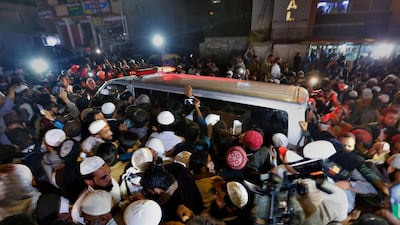Maulana Samiul Haq, influential religious scholar and cleric popularly known as "Father of the Taliban" was killed on Friday at his residence in Rawalpindi, his family said.
Mr Haq's son Hamidul Haq said his 82-year-old father had been stabbed to death in his home.
"He was alone in the home," Hamidul told journalists. "His security guard had gone out moments before the attack and upon his return the guard saw my father in a serious condition." Mr Haq was then taken to hospital, where he died.
Unknown assailants killed the religious leader, who was active among Afghan Taliban circles and a possible facilitator in talks between the Kabul government and the Taliban, his spokesperson Yousaf Shah said. There are contrary reports that he was also shot.
Mr Haq also taught some of the most important Afghan Islamist movement’s leaders, and was the chief of his own faction of the Jamiat Ulema Islam (JUI-S), promoting ‘jihad’ to every section of society. Mr Haq remained an influential figure whose views carry enormous weight among Taliban fighters on both sides of the Afghan-Pakistan border. At one time, he was running a popular seminary known as the University of Jihad in northwestern Pakistan.
Afghan Taliban spokesman Zabiullah Mujahid, told The National, the "He will be remembered as a great contributor to Islam and the people of Afghanistan will never forget his role and services for them ... his killers are the enemies of Islam.
Imran Khan, prime minister of Pakistan, expressed condolences for Mr Haq's death. He issued a statement from China, where he is currently on an official visit:
"We lost a great religious scholar and Islamic leader today," he said. Khan had been criticised in the past for financially supporting Mr Haq, including donating funds to the Haqqania seminary when he was head of a provincial government in 2016.
Back in the 1980s, many young Darul Uloom Haqqania graduates swapped books for guns and drove west along the highway running just outside its iron gates towards Afghanistan, where they joined Mujahideen groups to fight against the Russians.
One of them, Mullah Mohammed Omar, later took advantage of the chaos that followed the Soviet withdrawal in 1989 to found the Taliban movement.
_______________
Read more:
Pakistan at 'low point', Imran Khan tells China's Xi
The four delicate constituencies Imran Khan has to manage in order to achieve his goals
_______________
The seminary, founded in 1947, is now one of biggest and most respected Islamic institutions in South Asia. It propagates a hard-line curriculum based on the radical Deobandi strain of Sunni Islam.
Mr Haq repeatedly said that he and his seminary had nothing to do with terrorism. He had even offered to mediate between the United States and militants in order to bring peace to Afghanistan.
A Pakistani military spokesman condemned the killing and expressed grief and condolences to his family, saying "COAS strongly condemns the assassination of renowned religious scholar and political leader Moulana Sami ul Haq. Expresses grief and condolences to the bereaved family. "
Thousands of angry protesters came out on the streets in the northwestern city of Mardan near Haq’s seminary, setting a highway toll station on fire in the wake of the news.

